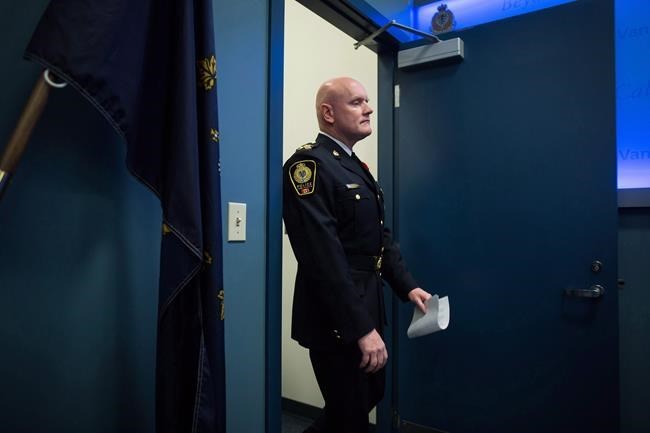
Vancouver Police Chief Adam Palmer arrives for a news conference in Vancouver, B.C., on Wednesday November 8, 2017. Canada's police chiefs are calling for decriminalization of personal possession of illicit drugs as the best way to battle substance abuse and addiction. THE CANADIAN PRESS/Darryl Dyck
Republished July 09, 2020 - 3:43 PM
Original Publication Date July 09, 2020 - 12:21 PM
OTTAWA - Canada's police chiefs are calling for decriminalization of personal possession of illicit drugs as the best way to battle substance abuse and addiction.
The Canadian Association of Chiefs of Police is proposing increased access to health care, treatment and social services to divert people away from the criminal justice system.
This would apply to people possessing a small amount of illicit drugs for personal consumption.
The Trudeau government has already legalized recreational use of marijuana with the goal of keeping pot out of the hands of young people and denying profits to organized criminals.
Canada continues to grapple with the fentanyl crisis and a poisoned drug supply that has devastated communities and taken thousands of lives, said Chief Const. Adam Palmer of Vancouver, the association president.
"We recommend that enforcement for possession give way to an integrated health-focused approach that requires partnerships between police, health care and all levels of government."
The chiefs say diversion would improve the health and safety outcomes for drug users while reducing property crime, repeat offences and the demand for drugs in communities.
They urge creation of a national task force to research drug policy reform, specifically looking at section 4(1) of the Controlled Drugs and Substances Act, covering simple possession.
The office of Health Minister Patty Hajdu did not respond to a request for comment.
Enforcement and judicial efforts must continue to target trafficking and the illegal production and importation of drugs to choke off the supply of harmful substances coming communities, the chiefs say.
But the traditional role of frontline policing has fundamentally shifted to harm reduction when interacting with people experiencing addiction or mental-health problems, Palmer said in a statement.
"Frequently, our officers are the point of first contact and the ones who will assist individuals in accessing appropriate services and pathways of care."
The chiefs' recommendations flow from the findings of a special committee to study the decriminalization of illicit drugs and its impact on public safety.
"We must adopt new and innovative approaches if we are going to disrupt the current trend of drug overdoses impacting communities across Canada," the committee report says.
"Merely arresting individuals for simple possession of illicit drugs has proven to be ineffective. Research from other countries who have boldly chosen to take a health rather than an enforcement-based approach to problematic drug use have demonstrated positive results."
This report by The Canadian Press was first published July 9, 2020.
News from © The Canadian Press, 2020